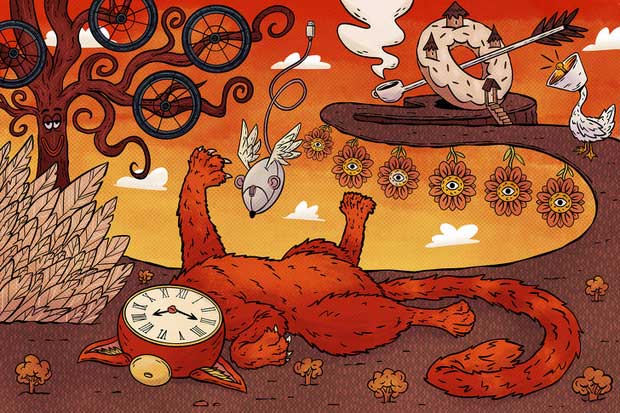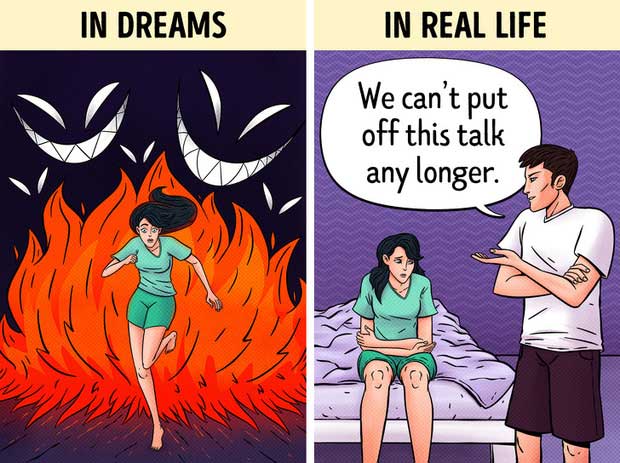Why do we dream about so much extraordinary things, even nightmares?
You may not realize it, but one-third of a person's life is devoted to sleeping. When we sleep, no one dreams, and each of our dreams has its own meaning. The only problem is what they mean.
The science of dreams doesn't really have much progress, so the data isn't much. But fortunately, thanks to the development of technology, science has been able to consider brain activity when people are fast asleep, and thus open the clues to the mystery of our dreams. .
Why do we have strange dreams?

Your dreams are often very messy, you can only realize it after waking up.
Surely we will sometimes encounter very illogical dreams, so strange that when we wake up no one understands what it means. Why? Science has several possible explanations.
Each of us has our own kind of dream, because the emotions and events we encounter each day are not the same. When sleeping, the brain will continue to work, allocating the short-term and long-term memories we meet during the day. Not only that, the brain compares them to each other, recreates and thereby creates confusion and strange dreams.
All dreams occur during rapid eye movement (REM ), lasting about 10-20 minutes and repeating many times during a sleep. At this stage, the levels of serotonin and norepinephrine - the two hormones responsible for logic and concentration - will decrease. Therefore, your dreams can be very chaotic, beyond the common sense that you can only realize it after waking up.
What about nightmares?

A nightmare is a way of "training" for the nervous system.
What about nightmares? Why do you dream about apocalypse, dreaming of being . chased by zombies, or dreaming of falling into a deep hun without smoking?
Experts from the University of Geneva (Switzerland) and Wisconsin (United States) have come together to find some solutions to this story. According to them, this is a way of "training" for the nervous system, to help a person be able to cope with negative emotions in reality. The emotions encountered in dreams will help the body prepare in advance, in response to stresses that may be encountered in the future.
Specifically, the researchers tracked the brain activity of the 18 candidates while they were sleeping, using the EEG system. The candidates woke up several times during the night, asked about the dream they were seeing at the time, and whether it was a nightmare. As a result, they found two areas responsible for such dreams, the occipital lobe and the cerebral cortex.
Interestingly, both of these areas are activated if people feel nervous or scared about something. Like the occipital lobe, it is responsible for evaluating emotions and activating as soon as we feel nervous. The other region is responsible for preparing appropriate responses and controlling our behavior when in danger. And especially, people who have frequent nightmares are better able to deal with the negative things in real life.
Up to now, some experts have somewhat analyzed the meaning of dreams we encounter - often with real-life problems. For example, dreaming of being chased by someone might mean you have an unresolved problem. Dreaming of free fall is because you have uncontrollable pressure. But this is not the final conclusion in general, and much more research is needed to know that.
- Decode the omen from the most frequent human dreams
- The reasons why people dream when they go to sleep
- The reasons people dream when they go to sleep
- Women have nightmares, and men dream about sex
- The meaning of nightmares you may not know
- 5 discoveries of human nightmares
- The secret of nightmares
- Things you may not know about the dream
- Nightmares help you control your fear
- How to diagnose the disease through dreams
- What does it mean to find yourself guilty?
- Strange things make people's dreams
- Decode nightmares in both sexes
- Science concludes: Dogs sleep like dreams
 'Fine laughs' - Scary and painful torture in ancient times
'Fine laughs' - Scary and painful torture in ancient times The sequence of numbers 142857 of the Egyptian pyramids is known as the strangest number in the world - Why?
The sequence of numbers 142857 of the Egyptian pyramids is known as the strangest number in the world - Why? History of the iron
History of the iron What is alum?
What is alum? Google data shows that nightmares are common in 7 countries: Fear of bees, fear of going to the doctor and even ex-lovers
Google data shows that nightmares are common in 7 countries: Fear of bees, fear of going to the doctor and even ex-lovers  Science has discovered that thousands of people have 'shared dreams'! What happened?
Science has discovered that thousands of people have 'shared dreams'! What happened?  What if humans could record and decode dreams?
What if humans could record and decode dreams?  This is a way to control lucid dream dreams at home
This is a way to control lucid dream dreams at home  Decode the premonition from the 9 most frequent dreams of man
Decode the premonition from the 9 most frequent dreams of man  What does it mean to find yourself guilty?
What does it mean to find yourself guilty? 